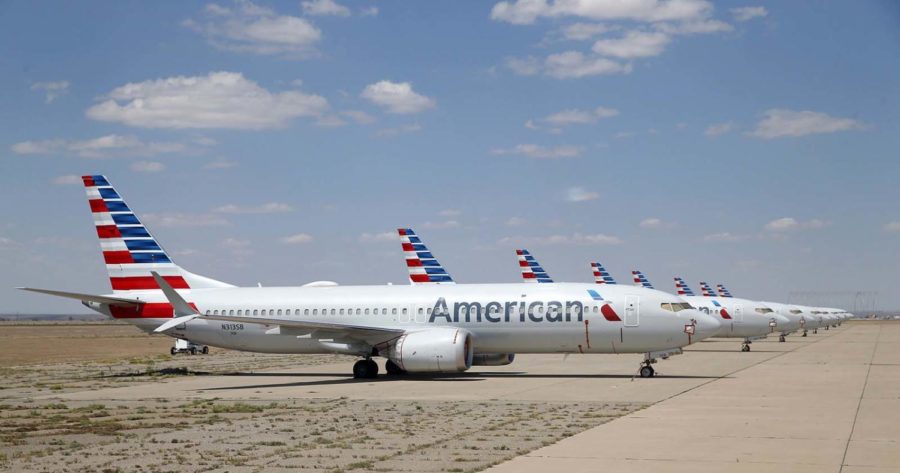Editorial: Deregulation has dangerous consequences
Tom Fox, The Dallas Morning News | TNS
Eight of about a dozen grounded American Airlines Boeing 737 Max 8 aircraft are parked on a remote taxiway at Roswell International Air Center in Roswell, New Mexico, on Wednesday, Sept. 4.
October 29, 2019
Manufacturer pushback on government regulations is hardly new. But in recent years, the federal government has given over more and more regulatory responsibilities to manufacturers in an attempt to reduce bureaucracy. This trend towards deregulation has proven to have unfortunate — and sometimes very dangerous — consequences.
Such is the case with Boeing, the most dominant aerospace manufacturer in the country. In the past year, two Boeing planes crashed, each within minutes of takeoff, killing hundreds of people. An article by the New York Times published Tuesday called into question certain passages of regulatory legislation passed weeks before the first crash, which made it easier for Boeing to challenge the government on safety concerns. This instance of deregulation and its fatal consequences shows how important federal regulation can be.
A Boeing 737 Max 8 crashed into the Java Sea minutes after taking off from Jakarta, Indonesia, in October 2018, killing 189 people. Five months later, a second 737 Max crashed minutes after taking off from Addis Ababa, Ethiopia, killing all 157 people on board. Both flights had a new automated system known as Maneuvering Characteristics Augmentation System, which was meant to avoid stalls and was accidentally triggered before both crashes, sending the planes into nosedives. The Federal Aviation Administration never fully assessed the new system.
This is due to a few paragraphs that were sneaked into the 463 pages of a regulatory bill that largely undercut the government’s regulatory power over the manufacturer. The regulator for the Max gave almost complete control over the project to Boeing, which was apparently the reason the FAA didn’t know much about the new automated system — an extreme oversight for something as important as safety.
As a consequence, hundreds of people lost their lives.
Not only was the FAA left largely in the dark, but the decrease in their regulatory power led to other weaknesses in the design and production of MCAS. For example, the system wasn’t stress-tested by the FAA, but rather by Boeing. Internal safety tests are naturally concerning, as they aren’t always as thorough as those conducted by separate institutions. Approval for MCAS also fell to Boeing, who didn’t have to share details of the system with the FAA’s engineers.
Late in the process of developing the Max, Boeing decided to use a newer, riskier version of MCAS. The company did not have to submit a new review after it made changes to the new system. The FAA was apparently aware of the changes, but it wasn’t the agency’s job to determine the system’s safety.
Nothing about this kind of regulation is safe or thorough, and in fact this regulatory system poses a major safety threat. Deregulation as a means of reducing bureaucracy doesn’t work well, as we’ve seen. It makes no sense to reduce the checks the government has in place over manufacturers for the purpose of ensuring all products meet the highest safety standards.
Lawmakers need to pay more attention to the lobbying efforts of companies like Boeing that could pose a threat to consumer safety. Rather than trending towards deregulation, they need to use regulations as a way to help consumers rather than hurt them.



